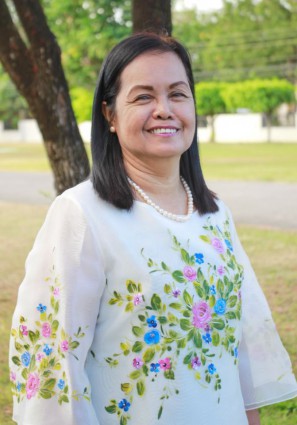
Engr. Evangeline Barroga Sibayan, 62, has served the agriculture industry for 37 years. Before her retirement this year, she shares some memories that made her career remarkable as well as some plans for herself and her family.
Vangie is a Supervising Science Research Specialist at our Rice Engineering and Mechanization Division (REMD). Prior to joining PhilRice, she was an agricultural engineer, for 10 years, at Maligaya Rice Research and Training Center (MRRTC) under the Bureau of Plant Industry. After the PhilRice-MRRTC merging, “Vangie” has since served PhilRice for 27 years.
Building one’s self through service
Vangie originally wanted to be a nurse. Being the second eldest in their family, she had six siblings, she had to follow a more pragmatic path. In 1973, she qualified for a scholarship at the Central Luzon State University (CLSU) for an agricultural engineering program. In a highly male-dominated program, Vangie was challenged to prove herself. Vangie has served the government in various capacities. Some of these include being a researcher, an administrative officer, a research specialist, and as an engineer.
Moreover, she had attended various training programs and participated in learning and development interventions that enhanced her expertise. Work at PhilRice inspired Vangie to pursue postgraduate studies. Her master’s degree opened doors for more opportunities as she established connections with different organizations, had more funding for her studies, and was able to do some consultancies. “Aside from being financially rewarding, my work at PhilRice and in the government in general, has helped me fulfill my dreams, bring me to different places, and make a name for myself professionally,” Vangie says.
Conquering challenges
Vangie did have several ups and downs at work, but she’s very happy that she’s been able to surpass them all.
“Maybe I am one of the oldest persons here [at the Institute], both in age and experience. Sometimes, we encounter problems that we do not expect. I always tell my colleagues that in all circumstances, we must treat each other equally. That is something I want my co-workers to remember when they think of me,” Vangie says.
Apart from her passion, she also acknowledges that she met quite a number of people at PhilRice that inspired her to always put her best foot forward. She has always kept in mind a quotation posted on the office of Former PhilRice Executive Director Leocadio Sebastian: You become successful when you help others become successful.
“When it was my turn to train people, I kept that quote in mind. It’s really fulfilling to know that you do it not only for the people around you, but most especially for the Lord,” Vangie says.
Leaving a mark
Aside from working in REMD, Vangie also worked at the Visitor’s Office, and was head of the Physical Plant Division.
“It’s really the management that decides on things. If our decision-makers feel that you are the right person for the job, you should take it. I think everybody should recognize that when you are assigned to a certain job, that means people trust you, and basically, they will give you the support you need,” Vangie adds.
One of the things that she particularly feels proud of is her contribution to the development and dissemination of the water-saving technology, Alternate Wetting and Drying (AWD), a collaborative work with the International Rice Research Institute (IRRI).
“Sometime in 2012 or 2013, during the technology’s national dissemination, I became a consultant of the United Nations Development Program (UNDP). I was tasked to write a proposal for the adoption of AWD,” Vangie shares. According to her, AWD can reduce the water required in rice cultivation by up to 35%. This means that the amount of water that farmers can save using this technology can be used to irrigate more farms. With this, farmers can reduce irrigation cost and use their savings for their other needs. Moreover, when they submitted the proposal to the United Nations Framework Convention on Climate Change (UNFCC) in 2015, they found that this technology, if managed properly, can also reduce greenhouse gas emissions, particularly methane.
“This will be a revolutionary technology in agriculture considering that 21% of the greenhouse gas emissions in the Philippines comes from irrigated rice production, based on the inventory of the Department of Environment and Natural Resources (DENR) and in which PhilRice was involved,” Vangie explains. According to her, working for this technology and seeing the potential that it has for agriculture inspires her to stay connected to this project even after her retirement.
“It really pays off when you see farmers adopt and improve their lives because of the technologies you promote or develop. It’s the kind of result that we should be proud of,” she says.
Vangie looks forward to spending more time with her family and friends. But, as with many of our retirees, she says that agriculture will always have a special place in her heart.




